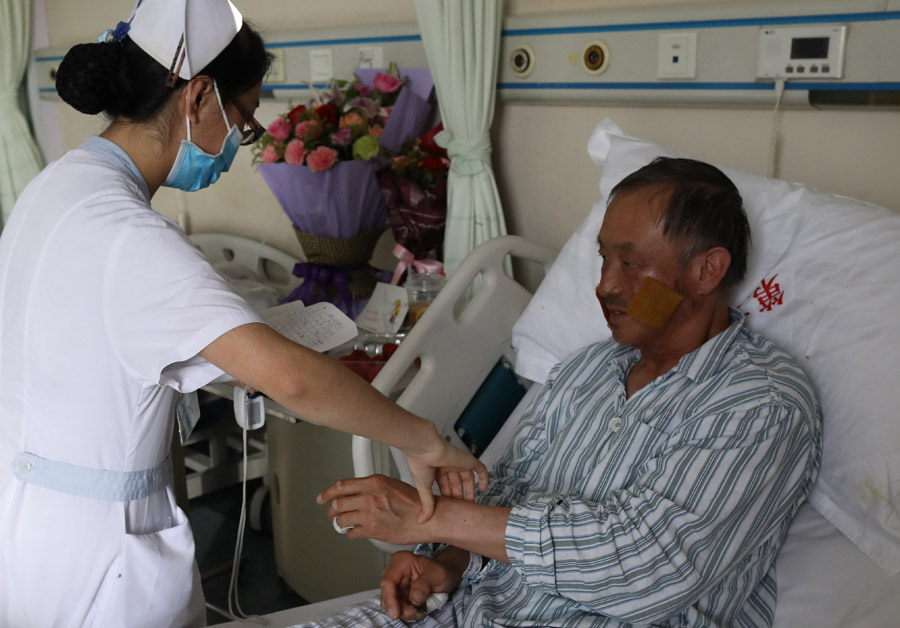Chinese amputee takes on a mountain
By Cheng Lu and Ni Yuanjin Xinhua | China Daily | Updated: 2018-05-29 09:29

Life means most
Born in Chongqing in 1949, Xia grew up in Qinghai province. He was good at soccer. Ke Qingfeng, one of his friends, jokes that Xia's disability was a big loss for Chinese soccer.
Xia was chosen by the Chinese mountaineering team in 1974 when he was working at a foundry.
"I heard that I could get a free health check and a trip to Beijing if I applied to be a mountaineer," he recalled. He didn't realize the decision would change his life.
The first climb by a Chinese team to the summit of Qomolangma was in 1960. In 1975, the second expedition, which included Xia, set off.
He and some teammates encountered a snowstorm just 200 meters below the summit and were forced to descend. Nine climbers eventually reached the top, but Xia suffered severe frostbite and lost both his feet. He heard the news of his teammates' success on the radio as he lay in bed awaiting the amputation.
"I was proud of my teammates but sad because I was not among them. I didn't dare to imagine my future of sitting in a wheelchair, perhaps forever," he said.
He felt hopeless until a doctor told him that on artificial limbs, he could live life like anyone else, and might even do quite a lot of physical exercise. His hopes were raised and he set a target: he would climb Qomolangma.
The vision of the mountain that came close to taking his life gave him the courage and hope to live on.
Xia made attempts in 2014, 2015 and 2016, but was defeated by an avalanche, an earthquake and bad weather.
In 2016, he came closer to the summit than ever before. With only about 100 meters to go, weather forced him to turn back.
"I knew I was running out of time. It might be my last chance. I had an impulse to rush to the top even though I knew I would die there," he said, but when he looked back and saw the Sherpa guides behind him, he hesitated.
"They were in their 20s or 30s, and they take these risky jobs just to feed their families. They should not have to die for my dream."
He decided to descend.
Some argue that Xia sets a bad example for physically disabled people who might be more likely to risk their lives on spurious challenges. Xia never thought that his dream would affect others: Everyone should consider their own position - physical strength, professional training and experience - before setting out on any quest, he said.
"Don't act on impulse. In all circumstances, life is the most important thing."
Persistence
Before retirement, Xia managed the archives at the Chinese Mountaineering Association. He took part in various Paralympic Games and international rock climbing competitions. He has won dozens of medals.
Twenty years on, he was hit by further bad fortune. He was diagnosed with lymphoma, and his legs were amputated below the knee. But the mountain loomed as large as ever in his heart.
Xia attributes his success to being versatile and physically strong and having a high tolerance of cold.
And persistence.
His persistence is beyond most people's imagination. To prepare for the fifth climb, he got up at four in the morning and completed 90 minutes of strength training at his Beijing home, including 1,500 squats, 100 pullups and 360 pushups. Then he rode a bike to Fragrant Hills, 20 kilometers from his home, for climbing training.
He hiked through the Tengger Desert and climbed many other high mountains such as Muztagh Ata, Yuzhu Peak, Balang Mountain and Mount Siguniang.
Climbing Qomolangma is an expensive hobby for a man with a pension of only around 6,000 yuan ($940), so he sought sponsorships and appeared in a few reality shows.
"I didn't want to be overexposed to the public but I needed money," said Xia, who calculates that he spent 350,000 yuan of his own money on top of the sponsorships.
A set of high-end equipment for a Qomolangma climb costs around 100,000 yuan. The fees paid to expedition companies that provide food, accommodations, training and guides for climbers range from 300,000 to 500,000 yuan, Xia said.
Every time he leaves home on a mountaineering expedition, he reminds his wife and son of many things over and over - when to pay the utility bills and what insurance he purchased - just in case he doesn't return.
"I always tell my wife and son that this is the last time, and I always break my promise," he said reproachfully. "They don't try to stop me, perhaps because they know I've experienced many hardships and don't want me to have regrets. Or perhaps they know I can't be stopped."
He nicknamed his son "Deng Deng" which literally means "climbing and climbing", but it doesn't mean he hopes his son will follow in his footsteps. "I just hope he remembers that his father is a mountaineer," he said.
His son, Xia Dengping, arrived at the base camp unannounced, surprising his father. It was the first time he had seen Qomolangma.
"Successful or not, I felt it would be my dad's last attempt at Qomolangma, so I should support him. Also, my mother said I should go," Xia Dengping said. "She doesn't support him much but she supports me supporting him."
Xia's story is being made into a documentary. When asked about his future, he has no idea. "I'm tired and want to have a good rest," he said.
When reports say he conquered Qomolangma, he demurs. "It is Qomolangma that accepted me," he said. "Nature cannot be conquered, but people can."
























